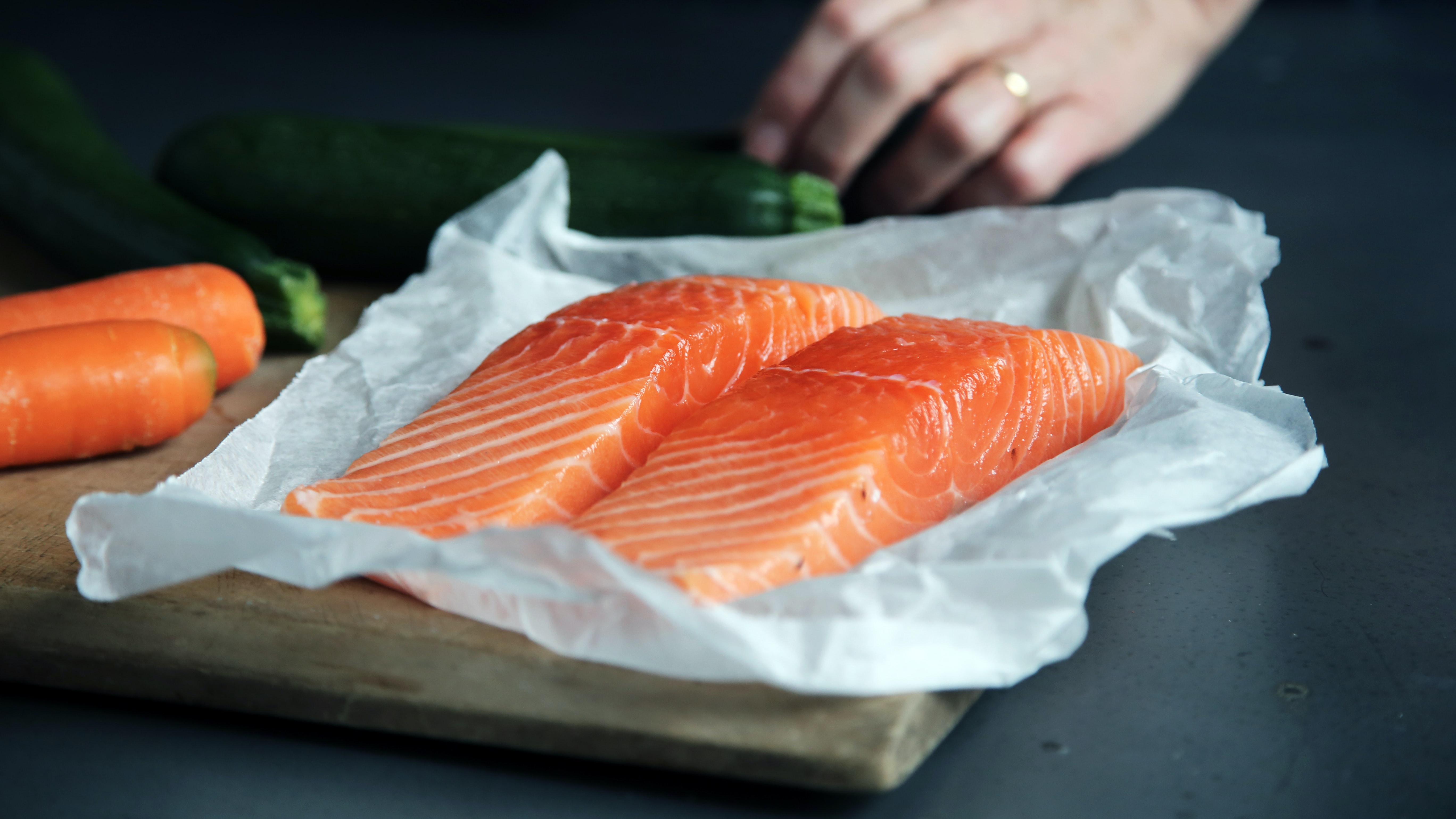Nutrition & Systemic Lupus Erythematosus

Table of Contents
1. General principles
2. Omega-3 fatty acids
3. Polyphenols
4. Vitamin D
5. FAQ
6. References
Systemic lupus erythematosus (lupus, or “SLE”) is a chronic disease that can be treated with a variety of medications but has no true cure. Naturally, many individuals with SLE want to know if how they eat or drink can be used as part of the treatment of their disease.
Understanding the exact relationship between nutrition and lupus is difficult. (Link to “what science can tell us about diet and heath”). Studies on the effect of nutrition among people with lupus are difficult to carry out and rarely pinpoint one specific thing to eat or avoid in the context of such a complex disease like SLE. Scientists and doctors often extrapolate some nutritional recommendations from studies involving mice with lupus, and while these studies are not the same as studying nutrition in humans with lupus, they can provide us with some helpful principles.
Though limited clinical research has examined the impact of diet on SLE specifically, large studies from different cultures around the world have found that certain eating patterns are associated with a lower risk of inflammation and certain chronic diseases. In particular, an anti-inflammatory plant-based diet that is high in fruits, vegetables, whole grains (such as wild rice, quinoa, or barley), beans, and nuts has been associated with better health (1, 2). Many studies also suggest that little to no consumption of processed food (such as fast food or junk food) is associated with better health as well (3, 4). While some disagree about the exact specifics of an anti-inflammatory diet, it is widely accepted that high amounts of fruits, vegetables, and plant-based protein sources form the backbone of a diet that fights inflammation. General diet patterns like this are unlikely to cure any chronic inflammatory disease but may reduce some SLE symptoms and improve overall health.

An example of an anti-inflammatory diet that has been linked to lower levels of inflammation and chronic disease is the Mediterranean diet. This is an eating pattern that is found in many areas that border the Mediterranean Sea, but the foods that are eaten and avoided in this diet can be tailored to nearly every culture. The Mediterranean diet focuses on high amounts of vegetables, fruit, olive oil, whole grains, and beans, and moderate amounts of fish, chicken, low-fat dairy, and nuts. The diet limits red meat, sugary drinks (including fruit juice), salt, processed foods, and processed meats. For additional information on the Mediterranean diet, please reference this summary from The American Heart Association.
The below information is based on the best data available from biomedical research. There are many ways of understanding the link between nutrition and health outside of biomedical research, including other systems of medicine, healing traditions, as well as cultural and religious beliefs. In this section we will discuss the data for SLE and nutrition that is available from human studies in Western medicine, as well as studies in SLE mice that can provide us with further information.
General principles
There are general principles that have clearly been linked to better health in populations around the world. While it is not clear if following these dietary patterns will specifically affect SLE and its complications, these eating patterns have been associated with lower rates of heart disease, diabetes, and obesity. Since these chronic problems occur with greater frequently among people with SLE, eating a generally anti-inflammatory diet can help offset some of these complications of SLE. For example, individuals with SLE who are obese can have worse SLE symptoms, so maintaining a healthy weight or making changes to facilitate gradual weight loss (if needed) is a critical—and often neglected—part of managing lupus (5, 6). Replacing high calorie processed meals and snacks with anti-inflammatory foods can help with feeling satisfied and maintaining a healthy weight. Similarly, heart disease and strokes are frequent in individuals with SLE, and can occur at a younger age than expected. As many anti-inflammatory plant-based foods have been known to prevent or even reverse heart disease, choosing foods that fight inflammation can help minimize this particular complication of SLE. Finally, based on a study in lupus-prone mice, there is reason to believe that eating a high-fiber diet protects against obesity and may reduce immune dysregulation in people with autoimmune conditions (7).
Th ere are some studies that have looked at the risk of developing lupus based on certain lifestyle factors, such as diet, exercise, or smoking. A large, long-term study that followed several thousand nurses for several decades found that diet alone did not seem to affect whether or not women in the study developed lupus. However, they found that a combination of five major lifestyle factors—having healthy eating patterns, maintaining a healthy body weight, exercising, consuming alcohol in moderation, and not smoking—were associated with a lower risk of developing lupus (8). While this study did not evaluate the impact of lifestyle factors on people who already had SLE, it stands to reason that these healthy principles may help lessen symptoms in SLE patients. Ultimately, healthy eating patterns should be complemented by additional beneficial lifestyle choices, such as staying away from all tobacco (including secondhand smoke) and regular physical activity.
ere are some studies that have looked at the risk of developing lupus based on certain lifestyle factors, such as diet, exercise, or smoking. A large, long-term study that followed several thousand nurses for several decades found that diet alone did not seem to affect whether or not women in the study developed lupus. However, they found that a combination of five major lifestyle factors—having healthy eating patterns, maintaining a healthy body weight, exercising, consuming alcohol in moderation, and not smoking—were associated with a lower risk of developing lupus (8). While this study did not evaluate the impact of lifestyle factors on people who already had SLE, it stands to reason that these healthy principles may help lessen symptoms in SLE patients. Ultimately, healthy eating patterns should be complemented by additional beneficial lifestyle choices, such as staying away from all tobacco (including secondhand smoke) and regular physical activity.
Omega-3 fatty acids
 Omega-3 fatty acids are “healthy fats” that are found in high concentrations in cold water fatty fish, such as salmon, mackerel, and sardines, as well as in some seeds, such as flaxseed and chia seed. There have been a handful of studies examining the effect of omega-3 fatty acids in SLE patients, and several showed a beneficial effect (9, 10). Of note, a one-year study showed that taking fish oil supplements during standard treatment for lupus nephritis (lupus inflammation in the kidneys) helped patients more than those who only received the standard therapy alone (11). While eating or supplementing with these fats may lead to a decrease in SLE disease activity, these fats may be even more helpful for combating fatigue and depressive symptoms, both common challenges among people with lupus (12, 13). As humans are very limited in their ability to synthesize omega-3 fatty acids and rely on food to increase the amount of omega-3’s in the body, it may be particularly helpful for people with systemic inflammatory conditions like SLE to consume foods high in omega-3 fatty acids on a regular basis.
Omega-3 fatty acids are “healthy fats” that are found in high concentrations in cold water fatty fish, such as salmon, mackerel, and sardines, as well as in some seeds, such as flaxseed and chia seed. There have been a handful of studies examining the effect of omega-3 fatty acids in SLE patients, and several showed a beneficial effect (9, 10). Of note, a one-year study showed that taking fish oil supplements during standard treatment for lupus nephritis (lupus inflammation in the kidneys) helped patients more than those who only received the standard therapy alone (11). While eating or supplementing with these fats may lead to a decrease in SLE disease activity, these fats may be even more helpful for combating fatigue and depressive symptoms, both common challenges among people with lupus (12, 13). As humans are very limited in their ability to synthesize omega-3 fatty acids and rely on food to increase the amount of omega-3’s in the body, it may be particularly helpful for people with systemic inflammatory conditions like SLE to consume foods high in omega-3 fatty acids on a regular basis.
Polyphenols
Polyphenols are anti-inflammatory chemicals that are naturally found in many types of plants. They are compounds that often give fruits and vegetables their distinctive color, odor, or taste. They are also found in abundance in many teas, spices, and herbs. Scientific studies have found that polyphenols are able to fight inflammation in many chronic diseases (14). A small study in 2012 with lupus patients who had kidney disease found that individuals who consumed curcumin (a chemical found in the turmeric root) in addition to their standard lupus medications had more improvement in their kidney inflammation than those who took standard lupus medications alone (15). These results are also supported by many mouse SLE studies (16-19). Similarly, green tea supplements have been studied in lupus patients and mouse studies and were found to be beneficial for controlling SLE (20, 21). While many polyphenol compounds have been studied only in lupus mice, and not in humans with lupus, other foods with high polyphenol content that may help with lupus-related problems include ginger, grapes, berries, and flaxseed (22-24).
Not surprisingly, the aforementioned Mediterranean diet is high in these naturally-occurring anti-inflammatory polyphenol compounds. Choosing a wide variety of spices and herbs for seasoning rather than relying on salt for enhancing flavor, and including fruits and veggies in every meal are good ways to consume foods high in polyphenols.


Vitamin D
Many individuals with lupus and other autoimmune diseases have low vitamin D levels. Currently the relationship between vitamin D and lupus activity is a bit of a chicken-or-the-egg scenario—we do not know if individuals with lupus are low in vitamin D because the lupus causes low levels, or if the low vitamin D played a role in the development of lupus. Regardless, we recommend that individuals with SLE be treated with vitamin D supplements if their levels are low, as this may ultimately help with controlling the underlying lupus (25). Medications used to treat lupus can cause low vitamin D and bone problems, so this is another reason to focus on eating high vitamin D foods or taking a supplement if recommended by your doctor. Foods that are naturally rich in vitamin D include salmon (and many other fish), eggs, and mushrooms.
For more information, please reference these General Nutrition Recommendations.
FAQ
Q: Should I follow a strict diet like a ketogenic (keto), paleo, or vegan diet?
A: Currently there is little to no evidence that such diets are a good choice for patients with SLE. In fact, individuals with SLE and kidney involvement should be encouraged to stay away from diets that are extremely high in protein (especially animal protein), such as the keto diet or paleo diet (26).
A vegan diet is often high in fiber and anti-inflammatory foods, but it is often difficult to sustain for many individuals and their families, and may not include sufficient amounts of certain important compounds for general health. A truly healthy vegan diet requires careful planning to ensure adequate amounts of protein and vitamins, and also requires that the individual avoid heavily processed vegan food, such as vegan cheese and fake meat. If a patient with SLE is interested in following a vegan diet, it would be wise to talk with a registered dietician, as well as with family and friends who will be sharing meals with the patient.
Q: Should I stop eating all sugar?
A: There are two main types of sugar: naturally occurring sugar (which is found in fruits and healthy grains), and processed/added sugar (such as the kind that is found in desserts). Unfortunately, there are no good studies looking at the direct effect of sugar on SLE. However, since eating a lot of processed sugar can lead to weight gain, obesity, and diabetes, which have a negative effect on SLE, it is recommended to avoid eating significant amounts of sugar by limiting desserts and low glycemic carbohydrates like white bread. Sources of “hidden” sugars in seemingly healthy food include many types of yogurts, pre-packaged oatmeal, jams, and pasta sauces, so be sure to check your labels or cook from scratch to avoid eating a lot of added sugar. As fruits and healthy grains are high in fiber and anti-inflammatory compounds, eating items that are rich in natural sugars is preferred over foods with added and/or processed sugar.
Q: Should I stop eating salt?
A: Salt is very hard to avoid in the classic American diet. There are no good human studies on salt and SLE, but a single mouse study suggested that a high-salt diet can worsen kidney disease in lupus (27). Further, anyone with high blood pressure or kidney problems, whether from SLE or another disease, should avoid eating a diet high in added salt. So, instead of reaching for the saltshaker to season your food, try using a variety of herbs and spices. As mentioned above, many herbs and spices contain high amounts of anti-inflammatory compounds, so they are a much healthier option for adding flavor to your food compared to salt.
Q: Should I stop drinking alcohol?
A: This is dependent on each individual’s case and should be discussed with your doctor. While there is some evidence that red wine in particular may be helpful in lowering inflammation and maybe preventing some chronic diseases (28, 29), every individual’s case is different and is dependent on current medications, preexisting alcohol use problems, and other chronic conditions. While there is no evidence that alcohol worsens lupus, it can interact with medications and exacerbate other health problems, so it is an important conversation to have with your doctor.
Q: Should I stop eating nightshade vegetables?
A: Nightshade vegetables are a group of vegetables that include tomatoes, bell peppers, eggplants, and potatoes. There is concern that there are molecules in nightshades that may cause inflammation in some individuals. However, this has not yet been studied in relation to SLE, either in humans with lupus or in mouse models of lupus. Since these vegetables are known to have ingredients that are very healthy and anti-inflammatory, there is no reason to eliminate them from your diet unless you have noticed specific problems from eating them.
References
1. Morze J, Danielewicz A, Hoffmann G, Schwingshackl L. Diet Quality as Assessed by the Healthy Eating Index, Alternate Healthy Eating Index, Dietary Approaches to Stop Hypertension Score, and Health Outcomes: A Second Update of a Systematic Review and Meta-Analysis of Cohort Studies. J Acad Nutr Diet. 2020;120(12):1998-2031.e15.
2. Carlos S, De La Fuente-Arrillaga C, Bes-Rastrollo M, Razquin C, Rico-Campà A, Martínez-González MA, et al. Mediterranean Diet and Health Outcomes in the SUN Cohort. Nutrients. 2018;10(4).
3. Srour B, Fezeu LK, Kesse-Guyot E, Allès B, Méjean C, Andrianasolo RM, et al. Ultra-processed food intake and risk of cardiovascular disease: prospective cohort study (NutriNet-Santé). BMJ. 2019;365:l1451.
4. Rico-Campà A, Martínez-González MA, Alvarez-Alvarez I, Mendonça RD, de la Fuente-Arrillaga C, Gómez-Donoso C, et al. Association between consumption of ultra-processed foods and all cause mortality: SUN prospective cohort study. BMJ. 2019;365:l1949.
5. Kang JH, Xu H, Choi SE, Park DJ, Lee JK, Kwok SK, et al. Obesity increases the incidence of new-onset lupus nephritis and organ damage during follow-up in patients with systemic lupus erythematosus. Lupus. 2020;29(6):578-86.
6. Patterson SL, Schmajuk G, Jafri K, Yazdany J, Katz P. Obesity is Independently Associated With Worse Patient-Reported Outcomes in Women with Systemic Lupus Erythematosus. Arthritis Care Res (Hoboken). 2019;71(1):126-33.
7. Schäfer AL, Eichhorst A, Hentze C, Kraemer AN, Amend A, Sprenger DTL, et al. Low Dietary Fiber Intake Links Development of Obesity and Lupus Pathogenesis. Front Immunol. 2021;12:696810.
8. Choi MY, Hahn J, Malspeis S, Stevens EF, Karlson EW, Sparks JA, et al. Association of a Combination of Healthy Lifestyle Behaviors With Reduced Risk of Incident Systemic Lupus Erythematosus. Arthritis Rheumatol. 2022;74(2):274-83.
9. Akbar U, Yang M, Kurian D, Mohan C. Omega-3 Fatty Acids in Rheumatic Diseases: A Critical Review. J Clin Rheumatol. 2017;23(6):330-9.
10. Ramessar N, Borad A, Schlesinger N. The effect of Omega-3 fatty acid supplementation in systemic lupus erythematosus patients: A systematic review. Lupus. 2022:9612033211067985.
11. Zhang C, Ge C, Wang J, Sun D. Fish oil enhanced the efficacy of low-dose cyclophosphamide regimen for proliferative lupus nephritis: a randomized controlled double-blind trial. Food Nutr Res. 2021;65.
12. Charoenwoodhipong P, Harlow SD, Marder W, Hassett AL, McCune WJ, Gordon C, et al. Dietary Omega Polyunsaturated Fatty Acid Intake and Patient-Reported Outcomes in Systemic Lupus Erythematosus: The Michigan Lupus Epidemiology and Surveillance Program. Arthritis Care Res (Hoboken). 2020;72(7):874-81.
13. Arriens C, Hynan LS, Lerman RH, Karp DR, Mohan C. Placebo-controlled randomized clinical trial of fish oil's impact on fatigue, quality of life, and disease activity in Systemic Lupus Erythematosus. Nutrition journal. 2015;14:82-.
14. Del Bo' C, Bernardi S, Marino M, Porrini M, Tucci M, Guglielmetti S, et al. Systematic Review on Polyphenol Intake and Health Outcomes: Is there Sufficient Evidence to Define a Health-Promoting Polyphenol-Rich Dietary Pattern? Nutrients. 2019;11(6).
15. Khajehdehi P, Zanjaninejad B, Aflaki E, Nazarinia M, Azad F, Malekmakan L, et al. Oral supplementation of turmeric decreases proteinuria, hematuria, and systolic blood pressure in patients suffering from relapsing or refractory lupus nephritis: a randomized and placebo-controlled study. Journal of renal nutrition : the official journal of the Council on Renal Nutrition of the National Kidney Foundation. 2012;22(1):50-7.
16. Lee H, Kim H, Lee G, Chung HS, Bae H. Curcumin attenuates lupus nephritis upon interaction with regulatory T cells in New Zealand Black/White mice. Br J Nutr. 2013;110(1):69-76.
17. Li Q, Tan S, Xu K, Fu X, Yu J, Yang H, et al. Curcumin attenuates lupus nephritis in MRL/lpr mice by suppressing macrophage-secreted B cell activating factor (BAFF). Int J Clin Exp Pathol. 2019;12(6):2075-83.
18. Wu T, Marakkath B, Ye Y, Khobahy E, Yan M, Hutcheson J, et al. Curcumin Attenuates Both Acute and Chronic Immune Nephritis. Int J Mol Sci. 2020;21(5).
19. Zhao J, Wang J, Zhou M, Li M, Tan H. Curcumin attenuates murine lupus via inhibiting NLRP3 inflammasome. Int Immunopharmacol. 2019;69:213-6.
20. Shamekhi Z, Amani R, Habibagahi Z, Namjoyan F, Ghadiri A, Saki Malehi A. A Randomized, Double-blind, Placebo-controlled Clinical Trial Examining the Effects of Green Tea Extract on Systemic Lupus Erythematosus Disease Activity and Quality of Life. Phytother Res. 2017;31(7):1063-71.
21. Tsai PY, Ka SM, Chang JM, Chen HC, Shui HA, Li CY, et al. Epigallocatechin-3-gallate prevents lupus nephritis development in mice via enhancing the Nrf2 antioxidant pathway and inhibiting NLRP3 inflammasome activation. Free Radic Biol Med. 2011;51(3):744-54.
22. Ali RA, Gandhi AA, Dai L, Weiner J, Estes SK, Yalavarthi S, et al. Antineutrophil properties of natural gingerols in models of lupus. JCI Insight. 2021;6(3).
23. Oliveira ALB, Monteiro VVS, Navegantes-Lima KC, Reis JF, Gomes RS, Rodrigues DVS, et al. Resveratrol Role in Autoimmune Disease-A Mini-Review. Nutrients. 2017;9(12).
24. Imran M, Ahmad N, Anjum FM, Khan MK, Mushtaq Z, Nadeem M, et al. Potential protective properties of flax lignan secoisolariciresinol diglucoside. Nutr J. 2015;14:71.
25. Islam MA, Khandker SS, Alam SS, Kotyla P, Hassan R. Vitamin D status in patients with systemic lupus erythematosus (SLE): A systematic review and meta-analysis. Autoimmunity reviews. 2019;18(11):102392-.
26. Ko GJ, Rhee CM, Kalantar-Zadeh K, Joshi S. The Effects of High-Protein Diets on Kidney Health and Longevity. J Am Soc Nephrol. 2020;31(8):1667-79.
27. Xiao ZX, Hu X, Zhang X, Chen Z, Wang J, Jin K, et al. High salt diet accelerates the progression of murine lupus through dendritic cells via the p38 MAPK and STAT1 signaling pathways. Signal Transduct Target Ther. 2020;5(1):34.
28. Snopek L, Mlcek J, Sochorova L, Baron M, Hlavacova I, Jurikova T, et al. Contribution of Red Wine Consumption to Human Health Protection. Molecules. 2018;23(7).
29. Mostofsky E, Mukamal KJ, Giovannucci EL, Stampfer MJ, Rimm EB. Key Findings on Alcohol Consumption and a Variety of Health Outcomes From the Nurses' Health Study. Am J Public Health. 2016;106(9):1586-91.




